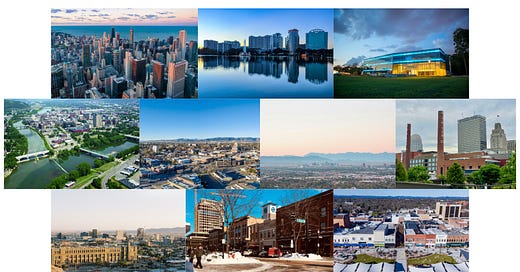The NSF's Emerging Innovation Engines
The government is putting $1.6 billion behind making these cities the next Huntsvilles and Menlo Parks.
In recent decades, federal research spending has been a story of geographic winners and losers. In 2019, 60% of all research dollars flowed to just six states, and four metro areas—Boston, Seattle, San Diego, and the San Francisco Bay Area—accounted for 90% of the US’s “innovation-sector growth” over the past 20 years.
Now, the government—specifically, the U.S. National Science Foundation and the U.S. Department of Commerce—are looking to spread the love. Earlier this year, the NSF tapped CHIPS Act funding to seed ten new “regional innovation engines,” areas that will receive grants for research, tech commercialization, and workforce development of up to $1.6 billion over the next decade.
This is interesting for two reasons. One, many of the places anointed are quite small and off-the-beaten-path for real estate investors. Of the 10 cities and regions the NSF has identified as emerging innovation engines, only three are in metro areas with more than a million people. For the other seven smaller cities, an infusion of government cash could have a tremendous impact on the local economy—and real estate market.
Two, government-funded scientific research is perhaps the most reliable leading indicator of a region’s long-term economic growth. Many of the strongest real estate growth stories of the past 50 years—Silicon Valley, Boston, San Diego, and Seattle, to name a few—benefitted from government research dollars that not only provided immediate, high-paying research jobs, but spawned technology startups and drew private investment. Smaller cities can also benefit; consider NASA’s role in fueling Huntsville’s tremendous growth, for example. And Pittsburgh’s relative success earning federal research dollars in robotics, AI, and healthcare enabled it to buck the trend of rust belt decline.
Today’s letter will explore the NSF’s new program through interviews with two leaders of the program: Daniel Goetzel, Entrepreneurial Lead for the NSF Regional Innovation Engines program within the agency’s Technology, Innovation and Partnerships (TIP) directorate, and Joda Thongnopnua, Special Advisor for the TIP directorate at NSF.
We’ll also take a look at the ten cities chosen to participate in the program from a real estate investment perspective.






